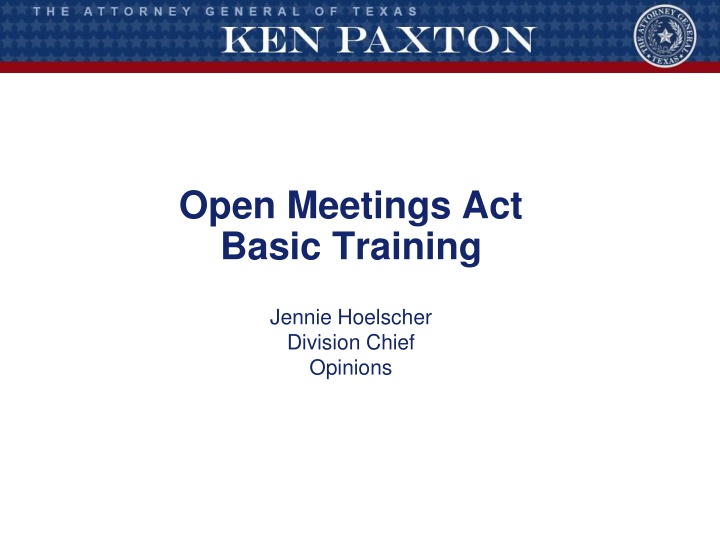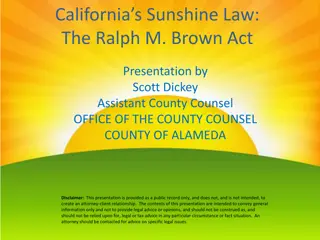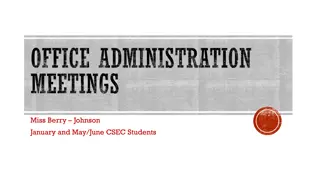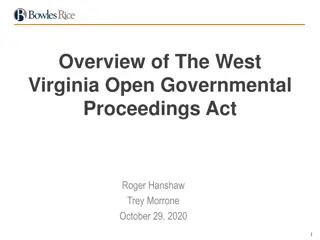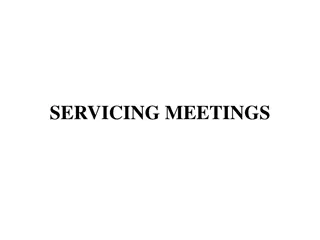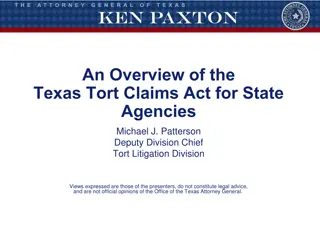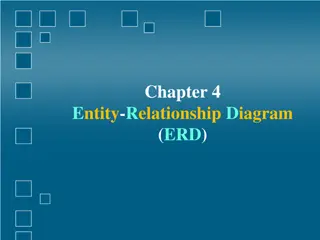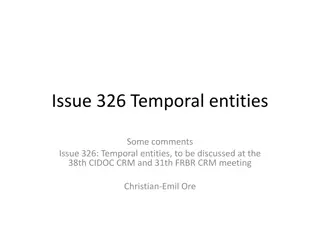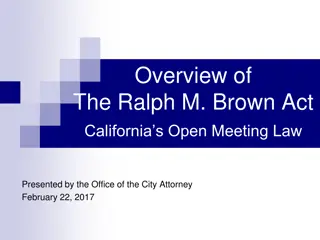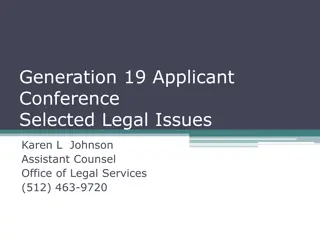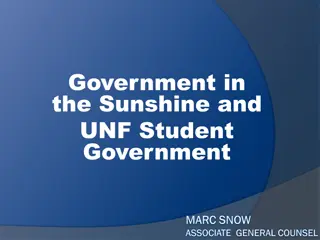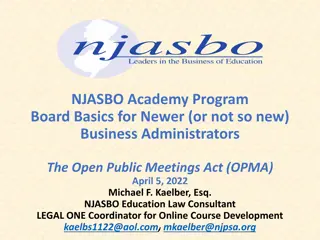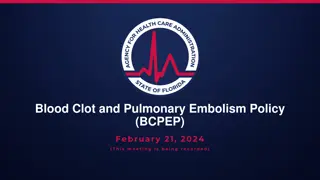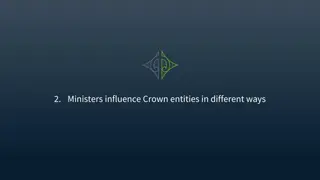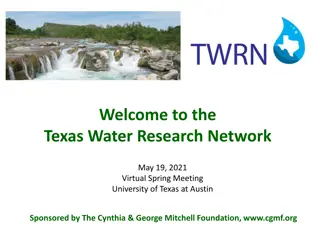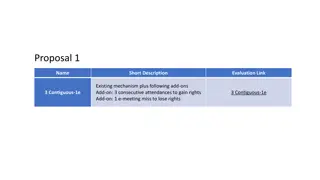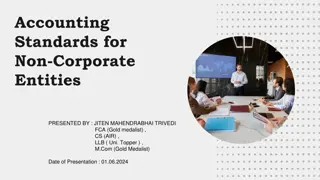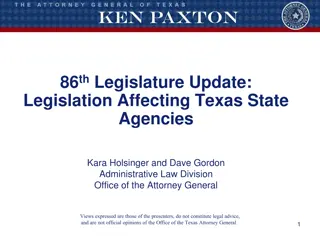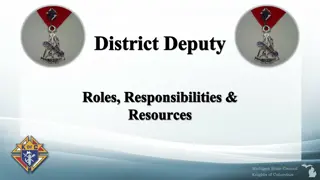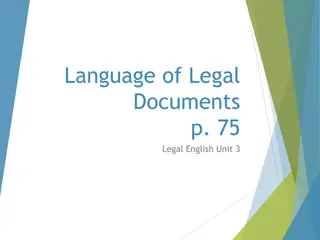Open Meetings Act for Texas Government Entities
The Open Meetings Act aims to safeguard the public interest by ensuring transparency in the workings of governmental bodies in Texas. This act promotes a presumption of openness and applies to various state entities, political subdivisions, and other related organizations.
Download Presentation

Please find below an Image/Link to download the presentation.
The content on the website is provided AS IS for your information and personal use only. It may not be sold, licensed, or shared on other websites without obtaining consent from the author.If you encounter any issues during the download, it is possible that the publisher has removed the file from their server.
You are allowed to download the files provided on this website for personal or commercial use, subject to the condition that they are used lawfully. All files are the property of their respective owners.
The content on the website is provided AS IS for your information and personal use only. It may not be sold, licensed, or shared on other websites without obtaining consent from the author.
E N D
Presentation Transcript
Open Meetings Act Basic Training Jennie Hoelscher Division Chief Opinions
Background What is the purpose of the Open Meetings Act?
Safeguard the Public Interest The Act is intended to safeguard the public s interest in knowing the workings of its governmental bodies. A public body s willingness to comply with the Open Meetings Act should be such that the citizens of Texas will not be compelled to resort to the courts to assure that a public body has complied with its statutory duty. Cox Enterprises, Inc. v. Board of Trustees of Austin Indep. Sch. Dist., 706 S.W.2d 956, 960 (Tex. 1986).
Presumption of Openness The provisions of the Open Meetings Act should be liberally construed to effect its purpose. Finlan v. City of Dallas, 888 F. Supp. 779, 782 (N.D. Tex. 1995).
Applicability of the Open Meetings Act Which governmental bodies are subject to the Open Meetings Act?
State Entities Subject to the Act A board, commission, department, committee, or agency within the executive or legislative branch of state government that is directed by one or more elected or appointed members Examples: Texas Water Development Board Texas Commission on Environmental Quality Texas Department of Transportation
Political Subdivisions Subject to the Act County commissioners courts Municipal governing bodies Deliberative bodies with rulemaking authority or quasi- judicial power that are classified as departments, agencies, or political subdivisions of a county or a municipality School district boards of trustees Governing boards of special districts created by law
Other Entities Subject to the Act Local workforce development boards Nonprofits eligible to receive federal funds under the federal community services block grant program Certain property owners associations in Harris County and the adjacent counties Entities made subject to the Act by their enabling legislation or their own rules or ordinances
When does the Act apply? Every regular, special, or called meeting of a governmental body shall be open to the public, except as provided by this chapter. Tex. Gov t Code 551.002.
Meeting Defined A quorum of members exchanges information about public business or public policy over which the body has supervision or control. The governmental body calls a gathering of a quorum of members to receive or give information to or from a third person about public business or public policy over which the governmental body has supervision or control.
Quorum A majority of a governmental body, unless defined differently by applicable law or rule or the charter of the governmental body
Requirements of the Act How does the Act protect the public s interest in knowing the workings of its governing bodies?
How the Act Furthers Openness Notice of Meetings Procedures to ensure openness during open meetings Procedures to ensure closed meetings are limited to the authorized discussions Broadcasting requirements Record keeping requirements
Notice of Meetings A governmental body shall give written notice of the date, hour, place, and subject of each meeting held by the governmental body. Tex. Gov t Code 551.041.
Providing Information on the Subject Notice must apprise the general public of subjects the governmental body will consider at a meeting. If uncertain, err on the side of providing more detail. Example:
Timing of Posting Most governmental bodies with statewide jurisdiction must post notice at least seven days before the date of the meeting. Political subdivisions must post at least 72 hours before the scheduled time of the meeting. All governmental bodies must post notice at least 1 hour before a meeting to address an emergency.
Location of Notice State Entities A state governmental body shall provide notice of each meeting to the Secretary of State, who shall post notice on the Internet. Search meeting agendas of state governmental bodies: https://texreg.sos.state.tx.us/public/pubomquery$.startup Example:
Location of Notice Political Subdivisions Counties on a bulletin board at a place convenient to the public in the county courthouse Municipal governmental bodies on a bulletin board at a place convenient to the public in city hall School districts on a bulletin board at a place convenient to the public in the central administrative office of the district Special districts extending into fewer than 4 counties (1) at a place convenient to the public in the administrative office of the district, and (2) either on a bulletin board at the courthouse of each county in the district or on the district s website
Location of Notice Internet Posting Some entities must post notice on the Internet if they maintain a website or have populations over a certain size: Municipalities Counties School districts Junior College Districts Economic development corporations Regional mobility authorities
Logistical Requirements for Open Meetings Hold the meeting in a location accessible to the public In or near the boundaries of the governmental body Without special access requirements that may prevent entry for the public Provide space for the public so that they may attend the meeting Provide reasonable visual or audio accommodations if requested in advance of the meeting
Public Comment State entities may, but are not required to, provide for public comment during their meetings. Political subdivisions must allow members of the public interested in speaking on an item on the agenda to do so before or during the governmental body s discussion of that item. May create reasonable rules May not discriminate based on the position taken May not prohibit criticism of the governmental body
Broadcasting Meetings All governmental bodies may broadcast their open meetings over the Internet. The governing boards of general academic teaching institutions, university systems, and junior college districts must broadcast their meetings over the Internet.
Recordkeeping for Open Meetings Governmental bodies must prepare and keep minutes or make a recording of each open meeting. If keeping minutes, the minutes must state the subject of each deliberation and indicate each vote, order, decision, or other action taken. The minutes and recordings are public records and must be available for public inspection.
Members of the Public May Record A person in attendance at an open meeting may record all or any part of the meeting. A governmental body may adopt reasonable rules to maintain order at the meeting as long as the rules do not unreasonably impair a person from recording.
Required Training on the Act Each elected or appointed public official who is a member of a governmental body must complete training on the requirements of the Act within 90 days of taking office. The governmental body shall maintain and make available for public inspection the record of its members completion of the training.
Voidability An action taken by a governmental body in violation of this chapter is voidable. An interested person, including a member of the news media, may bring an action by mandamus or injunction to stop, prevent, or reverse a violation or threatened violation of the Act. A court may assess costs and attorney fees to the prevailing party.
Exceptions to the General Rules Closed Meetings Social Gatherings Emergencies Online Message Boards Teleconferencing and Videoconferencing
Closed Meetings or Executive Sessions The Act specifies instances when governmental bodies may conduct closed meetings without allowing public access, including, among others: Consultations with an attorney about pending or contemplated litigation Deliberations regarding the purchase of real property if deliberation in an open meeting would compromise negotiations Deliberation about personnel matters related to a specific employee if the employee does not request a public hearing
Procedures for Closed Meetings Notice requirements still apply. The governmental body must first convene in open session before going into closed session. The governmental body must identify the specific legal provision allowing for the closed session. The subject of discussions in closed meeting must be limited to what the Act authorizes. No final action or vote may be taken in a closed meeting.
Criminal Penalties for Unauthorized Closed Meetings A member of a governmental body commits an offense if a closed meeting is not permitted under the Act and the member knowingly participates in the closed meeting. The offense is a misdemeanor punishable by a fine of between $100-$500, confinement in county jail for between 1-6 months, or both.
Closed Meeting Recordkeeping A governmental body shall either keep a certified agenda or make a recording of proceedings of each closed meeting, except for attorney consultations under section 551.071. If keeping a certified agenda, it must include: A statement of the subject of each deliberation A record of any further action taken An announcement by the presiding officer at the beginning and end of the closed session indicating the date and time Certification by the presiding officer that an agenda kept under subsection (a) is a true and correct record of the proceedings
Criminal Penalties for Failure to Keep a Certified Agenda or Recording It is a class C misdemeanor to participate in a closed meeting knowing that a certified agenda or recording of the closed meeting is not being made.
Preserving the Certified Agenda A governmental body must maintain the certified agenda or recording of a closed meeting for at least two years from the date of the meeting. If Open Meetings Act litigation arises, the court is entitled to make an in camera inspection of the certified agenda or recording. The certified agenda or recording is only available for public inspection if ordered by a court.
Criminal Penalties for Disclosing a Certified Agenda or Recording It is a class B misdemeanor to disclose a certified agenda or recording to a member of the public without a court order. The disclosing person can be liable to a person injured or damaged by the disclosure for actual damages, attorney fees, and exemplary damages.
Social Gatherings As long as no formal action is taken and any discussion of public business is incidental to the event, a governmental body does not meet when a quorum gathers at a: social function regional, state, or national convention or workshop ceremonial event press conference candidate forum, appearance, or debate to inform the electorate
Emergency Situations An emergency or urgent public necessity exists only if immediate action is required of a governmental body because of: an imminent threat to public health and safety, or a reasonably unforeseeable situation Examples of a reasonably unforeseeable situation include: fire, flood, earthquake, hurricane, tornado, or storm power failure, transportation failure, or interruption of communication facilities epidemic riot, civil disturbance, enemy attack, or other actual or threatened act of lawlessness or violence
Addressing Emergencies The Act generally still applies during emergencies, but the timing required for notice of a meeting to address an emergency is shortened. Notice must be posted at least one hour before the meeting is convened. The discussion and action on the matter must be directly related to responding to the emergency. The governmental body must clearly identify the emergency in the notice. The meeting can occur by teleconference if convening a quorum of the governmental body is difficult. The public must still be able to attend at the normal meeting location.
Sample Emergency Notice Emergency Meeting Notice Tejas City Council December 29, 2020 An emergency meeting of the City Council of Tejas will be held on December 29, 2020, beginning at 3:00 p.m. in Council Chambers at City Hall, 4220 Main St., Tejas, Texas 76543. An emergency or urgent public necessity exists that requires immediate action of the Council. The wind damage and flooding resulting from Hurricane Huey has caused significant damage to city infrastructure and emotional and physical distress to city residents, requiring an immediate response. The subjects to be discussed include: . . . .
Online Message Boards The Act allows written communications or exchanges of information between members of a governmental body if the writing is posed to an online message board, viewable and searchable by the public. The message board must be prominently displayed on the home page of the governmental body s website. The communication must be displayed in real time and displayed for at least 30 days. Communications must be archived for 6 years. No vote or final action may be taken on the message board.
Teleconferencing A governmental body may use a telephone conference call to conduct a meeting: in consultation with its attorney to address an emergency situation if convening a quorum in one location is difficult Each part of the open meeting must be audible to the public at the location specified in the notice of the meeting
Videoconferencing Governmental bodies may use videoconferencing to ensure members can attend the meetings. The requirements for a quorum present at the physical meeting location vary depending on the type of governmental body. Technological requirements exist to ensure members of the public can observe the full discussions occurring by videoconference.
Attempts to Avoid the Acts Requirements A member of a governmental body commits an offense if the member: knowingly engages in at least one communication among a series of communications that each occur outside of a meeting authorized by the Act and that concern an issue within the jurisdiction of the governmental body in which the members engaging in the individual communications constitute fewer than a quorum but the members engaging in the series of communications constitute a quorum of members; and knew at the time the member engaged in the communication that the series of communications: involved or would involve a quorum; and would constitute a deliberation once a quorum of members engaged in the series of communications
Communications by Email Deliberation can occur as either a written or oral exchange between members of a governmental body. A series of emails involving a quorum of a governmental body discussing an issue within the jurisdiction of the governmental body could constitute a deliberation and an unauthorized meeting for purposes of the Act.
How to Obtain the Training Certificate https://www2.texasattorneygeneral.gov/forms/openrec/og_c ertificates.php Enter the following information: Click next, enter your name as you would like it to appear on your certificate, and click submit. Generate and print your certificate.
